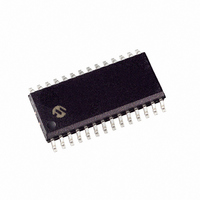DSPIC30F2010-30I/SO Microchip Technology, DSPIC30F2010-30I/SO Datasheet - Page 31

DSPIC30F2010-30I/SO
Manufacturer Part Number
DSPIC30F2010-30I/SO
Description
IC DSPIC MCU/DSP 12K 28SOIC
Manufacturer
Microchip Technology
Series
dsPIC™ 30Fr
Datasheets
1.DSPIC30F2011-20ISO.pdf
(66 pages)
2.DSPIC30F2010-20ISO.pdf
(202 pages)
3.DSPIC30F2010-20ISO.pdf
(18 pages)
4.DSPIC30F2010-20ISO.pdf
(6 pages)
5.DSPIC30F2010-20ISO.pdf
(26 pages)
6.DSPIC30F2010-20IMM.pdf
(204 pages)
Specifications of DSPIC30F2010-30I/SO
Core Processor
dsPIC
Core Size
16-Bit
Speed
30 MIPs
Connectivity
I²C, SPI, UART/USART
Peripherals
Brown-out Detect/Reset, Motor Control PWM, QEI, POR, PWM, WDT
Number Of I /o
20
Program Memory Size
12KB (4K x 24)
Program Memory Type
FLASH
Eeprom Size
1K x 8
Ram Size
512 x 8
Voltage - Supply (vcc/vdd)
2.5 V ~ 5.5 V
Data Converters
A/D 6x10b
Oscillator Type
Internal
Operating Temperature
-40°C ~ 85°C
Package / Case
28-SOIC (7.5mm Width)
Core Frequency
40MHz
Core Supply Voltage
5.5V
Embedded Interface Type
I2C, SPI, UART
No. Of I/o's
20
Flash Memory Size
12KB
Supply Voltage Range
2.5V To 5.5V
Package
28SOIC W
Device Core
dsPIC
Family Name
dsPIC30
Maximum Speed
30 MHz
Operating Supply Voltage
3.3|5 V
Data Bus Width
16 Bit
Number Of Programmable I/os
20
Interface Type
I2C/SPI/UART
On-chip Adc
6-chx10-bit
Number Of Timers
3
Lead Free Status / RoHS Status
Request inventory verification / Request inventory verification
Available stocks
Company
Part Number
Manufacturer
Quantity
Price
Part Number:
DSPIC30F2010-30I/SO
Manufacturer:
MICROCHIP/微芯
Quantity:
20 000
Company:
Part Number:
DSPIC30F2010-30I/SOG
Manufacturer:
TOS
Quantity:
453
4.0
The dsPIC DSC core contains two independent
address generator units: the X AGU and Y AGU. The Y
AGU supports word-sized data reads for the DSP MAC
class of instructions only. The dsPIC DSC AGUs
support three types of data addressing:
• Linear Addressing
• Modulo (Circular) Addressing
• Bit-Reversed Addressing
Linear and Modulo Data Addressing modes can be
applied to data space or program space. Bit-Reversed
Addressing is only applicable to data space addresses.
TABLE 4-1:
© 2011 Microchip Technology Inc.
File Register Direct
Register Direct
Register Indirect
Register Indirect Post-modified
Register Indirect Pre-modified
Register Indirect with Register Offset
Register Indirect with Literal Offset
Note:
ADDRESS GENERATOR UNITS
Addressing Mode
This data sheet summarizes features of
this group of dsPIC30F devices and is not
intended to be a complete reference
source. For more information on the CPU,
peripherals, register descriptions and
general device functionality, refer to the
“dsPIC30F Family Reference Manual”
(DS70046). For more information on the
device instruction set and programming,
refer to the “16-bit MCU and DSC Pro-
grammer’s
(DS70157).
FUNDAMENTAL ADDRESSING MODES SUPPORTED
Reference
The address of the file register is specified explicitly.
The contents of a register are accessed directly.
The contents of Wn forms the Effective Address (EA).
The contents of Wn forms the EA. Wn is post-modified (incremented or
decremented) by a constant value.
Wn is pre-modified (incremented or decremented) by a signed constant
value to form the EA.
The sum of Wn and Wb forms the EA.
The sum of Wn and a literal forms the EA.
Manual”
4.1
The Addressing modes in
the Addressing modes optimized to support the specific
features of individual instructions. The Addressing
modes provided in the MAC class of instructions are
somewhat different from those in the other instruction
types.
4.1.1
Most file register instructions use a 13-bit address field
(f) to directly address data present in the first 8192
bytes of data memory (near data space). Most file
register instructions employ a working register W0,
which is denoted as WREG in these instructions. The
destination is typically either the same file register, or
WREG (with the exception of the MUL instruction),
which writes the result to a register or register pair. The
MOV instruction allows additional flexibility and can
access the entire data space.
Instruction Addressing Modes
Description
FILE REGISTER INSTRUCTIONS
dsPIC30F2010
Table 4-1
DS70118J-page 31
form the basis of























